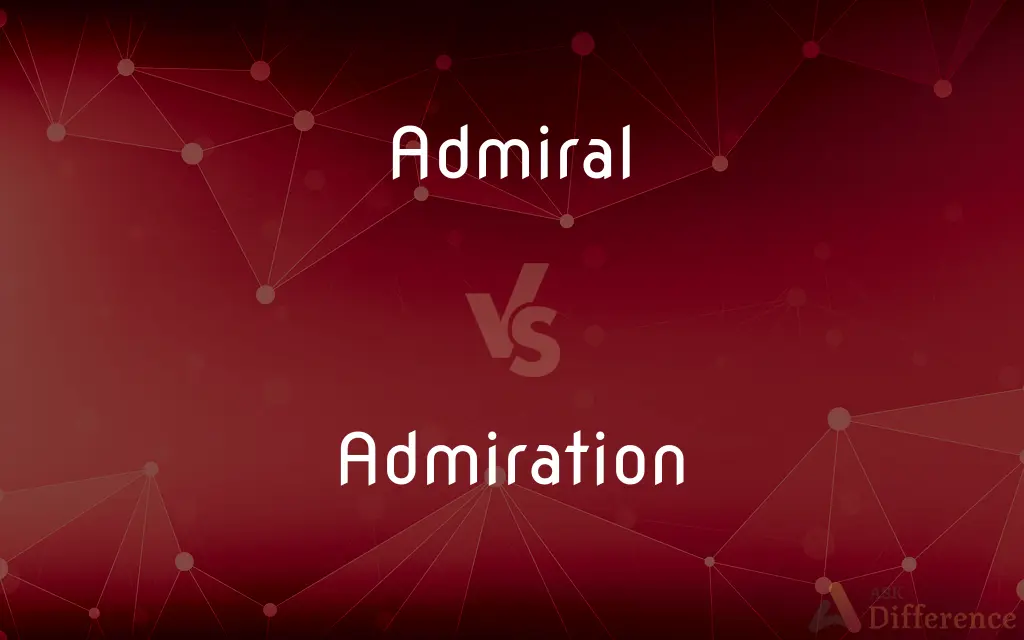Admiral vs. Admiration — What's the Difference?
By Tayyaba Rehman & Urooj Arif — Updated on April 6, 2024
Admiral emphasizes a high-ranking naval officer, while admiration focuses on feelings of respect or warm approval.

Difference Between Admiral and Admiration
Table of Contents
ADVERTISEMENT
Key Differences
Admiral is a title used within naval forces to denote a senior rank, typically commanding multiple ships or even entire fleets. Whereas, admiration is an emotional response, signifying respect, approval, or affection directed towards someone or something.
Admirals play a crucial role in naval operations, strategy, and leadership, often responsible for significant maritime areas. On the other hand, admiration can be felt towards a wide range of subjects, including people, achievements, or objects, reflecting personal values or aesthetic appreciation.
The term admiral has a clear, structured definition within the military hierarchy, indicating a specific level of authority and responsibility. In contrast, admiration is subjective, varying greatly in intensity and reasons from one individual to another.
While an admiral's role and status are recognized and formalized through military ranks and titles, admiration is expressed through personal gestures, words, or thoughts, often without formal acknowledgment.
Admirals are integral to the administration, decision-making, and leadership within the navy, underlining the importance of military discipline and strategy. Admiration, however, stems from emotional connectivity and personal admiration, highlighting human sentiments and psychological responses.
ADVERTISEMENT
Comparison Chart
Definition
A senior naval officer of high rank.
A feeling of respect or approval.
Context
Military, specifically naval.
Emotional, personal, or aesthetic.
Expression
Through rank and position.
Through words, gestures, or thoughts.
Basis
Professional achievement and authority.
Emotional response or aesthetic appreciation.
Variability
Structured and hierarchical.
Subjective and personal.
Compare with Definitions
Admiral
Symbol of Authority in Navy.
The arrival of the admiral signified the importance of the military ceremony.
Admiration
Feeling of Warm Approval.
His courage in rescue operations earned him the admiration of the town.
Admiral
High-Ranking Naval Officer.
The admiral commanded the fleet with great expertise during the maritime operation.
Admiration
Emotional Response to Achievement.
The team's victory brought admiration from fans across the country.
Admiral
Military Leadership Role.
As an admiral, she was responsible for strategic planning and execution at sea.
Admiration
Expression of Esteem.
They looked at the humanitarian with admiration for his selfless service.
Admiral
Title Within Naval Hierarchy.
He was promoted to admiral after years of distinguished service.
Admiration
Respect for Someone's Qualities.
Her integrity and dedication to work were met with widespread admiration.
Admiral
Command Over Ships and Operations.
The admiral oversaw the naval blockade, ensuring its success.
Admiration
Appreciation of Beauty or Talent.
The painting drew admiration for its exquisite detail and emotion.
Admiral
Admiral is one of the highest ranks in some navies. In the Commonwealth nations and the United States, a "full" admiral is equivalent to a "full" general in the army, and is above vice admiral and below admiral of the fleet, or fleet admiral.
Admiration
Admiration is a social emotion felt by observing people of competence, talent, or skill exceeding standards. Admiration facilitates social learning in groups.
Admiral
The most senior commander of a fleet or navy.
Admiration
Respect and warm approval
I have the greatest admiration for all those involved in the project
Admiral
A butterfly which has dark wings with bold red or white markings.
Admiration
A feeling of strong approval or delight with regard to someone or something
The students' admiration for their teacher.
Admiral
The commander in chief of a fleet.
Admiration
The state of being viewed with such approval or delight
An actor held in admiration by her peers.
Admiral
A flag officer.
Admiration
The object of such approval and delight
A movie that was the admiration of many critics.
Admiral
A commissioned rank in the US Navy or Coast Guard that is above vice admiral and below Fleet Admiral.
Admiration
(Archaic) The action of wondering; marveling.
Admiral
One who holds the rank of admiral, Fleet Admiral, rear admiral, or vice admiral.
Admiration
A positive emotion including wonder and approbation; the regarding of another as being wonderful
Admiration of a war hero
They looked at the landscape in admiration.
Admiral
Any of various brightly colored nymphalid butterflies of the genera Limenitis and Vanessa, especially V. atalanta, having black wings with red bands.
Admiration
(obsolete) Wondering or questioning (without any particular positive or negative attitude to the subject).
Admiral
(Archaic) The ship carrying an admiral; flagship.
Admiration
(obsolete) Cause of admiration; something to excite wonder, or pleased surprise.
Admiral
A naval officer of the highest rank; the commander of a country's naval forces.
Admiration
Wonder; astonishment.
Season your admiration for a while.
Admiral
A naval officer of high rank, immediately below Admiral of the Fleet; the commander of a fleet or squadron.
Admiration
Wonder mingled with approbation or delight; an emotion excited by a person or thing possessed of wonderful or high excellence; as, admiration of a beautiful woman, of a landscape, of virtue.
Admiral
A flag officer in the United States Navy or Coast Guard of a grade superior to vice admiral and junior to admiral of the fleet (when that grade is used). An admiral is equal in grade or rank to a four-star general.
Admiration
Cause of admiration; something to excite wonder, or pleased surprise; a prodigy.
Now, good Lafeu, bring in the admiration.
Admiral
The ship which carries the admiral, the flagship; also, the most considerable ship of a fleet.
Admiration
A feeling of delighted approval and liking
Admiral
(obsolete) A prince or Saracen leader under the Sultan.
Admiration
The feeling aroused by something strange and surprising
Admiral
Any of various nymphalid butterflies of the genera Kaniska, Limenitis and Vanessa, especially a red admiral or white admiral.
Admiration
A favorable judgment;
A small token in admiration of your works
Admiral
A naval officer of the highest rank; a naval officer of high rank, of which there are different grades. The chief gradations in rank are admiral, vice admiral, and rear admiral. The admiral is the commander in chief of a fleet or of fleets.
Admiral
The ship which carries the admiral; also, the most considerable ship of a fleet.
Like some mighty admiral, dark and terrible, bearing down upon his antagonist with all his canvas straining to the wind, and all his thunders roaring from his broadsides.
Admiral
A handsome butterfly (Pyrameis Atalanta) of Europe and America. The larva feeds on nettles.
Admiral
The supreme commander of a fleet; ranks above a vice admiral and below a fleet admiral
Admiral
Any of several brightly colored butterflies
Common Curiosities
Can admiration be felt towards inanimate objects?
Yes, admiration can be directed towards inanimate objects, such as art or achievements, for their beauty or significance.
Do admirals have specific responsibilities?
Yes, admirals are responsible for strategic planning, leadership, and operational decisions within the navy.
What defines an admiral in the navy?
An admiral is a senior naval officer of high rank, typically commanding multiple ships or entire fleets.
How does culture influence admiration?
Cultural values and norms significantly influence what qualities or achievements are admired.
Can one feel admiration for an adversary?
Yes, it's possible to feel admiration for an adversary's qualities or achievements despite being in opposition.
Is admiration always positive?
Admiration is generally positive, reflecting respect, approval, or affection towards someone or something.
How is the rank of an admiral achieved?
The rank of an admiral is achieved through promotion within the naval forces, often after years of distinguished service and leadership.
Are there different ranks among admirals?
Yes, many navies have several ranks within the admiral category, such as rear admiral, vice admiral, and admiral.
Is there a symbol that represents an admiral?
Yes, admirals often have specific insignia or flags denoting their rank and authority.
How do admirals impact naval strategy?
Admirals play a crucial role in shaping naval strategy, operational planning, and decision-making.
Can admiration be learned?
While admiration is a natural emotion, recognizing and appreciating qualities in others can be cultivated over time.
Can admiration turn into envy?
While admiration is positive, excessive admiration without self-reflection can sometimes lead to envy.
What role does admiration play in motivation?
Admiration can be a powerful motivator, inspiring individuals to emulate admired qualities or achievements.
How is the success of an admiral measured?
The success of an admiral is measured by their leadership effectiveness, strategic outcomes, and the achievements of their command.
Does admiration require personal interaction?
No, admiration can be felt without personal interaction, based on someone’s actions, achievements, or qualities.
Share Your Discovery

Previous Comparison
Caution vs. Warning
Next Comparison
Clay vs. SiltAuthor Spotlight
Written by
Tayyaba RehmanTayyaba Rehman is a distinguished writer, currently serving as a primary contributor to askdifference.com. As a researcher in semantics and etymology, Tayyaba's passion for the complexity of languages and their distinctions has found a perfect home on the platform. Tayyaba delves into the intricacies of language, distinguishing between commonly confused words and phrases, thereby providing clarity for readers worldwide.
Co-written by
Urooj ArifUrooj is a skilled content writer at Ask Difference, known for her exceptional ability to simplify complex topics into engaging and informative content. With a passion for research and a flair for clear, concise writing, she consistently delivers articles that resonate with our diverse audience.














































